
In a rapidly growing IT sector, old technologies that can’t keep up with modern requirements have become outdated. However, a few traditional web development technologies are still relevant and useful. Among them, PHP is one of the most cherished programming languages. PHP offers a multitude of advantages. It is easy to collaborate with a top PHP development company that can design websites or dynamic web apps for you. If you’re curious about why PHP remains relevant in the age of AI and machine learning then read this article explaining the advantages and disadvantages of PHP in web application development.
1. Overview of PHP
Initially referred to as Personal HomePage, PHP is now popularly known as Hypertext PreProcessor. It is a server-side scripting language used for designing websites and web apps. Developers can also use PHP in a wide range of projects, including GUIs.
Empowers popular platforms like Facebook and Harvard University, PHP is both an open-source and user-friendly programming language. Creating, maintaining, and updating large-scale web applications is easy when using PHP. It also offers seamless integration with various databases and development environments. PHP has a gentler learning curve and an easy setup.
2. List of Advantages of PHP Development
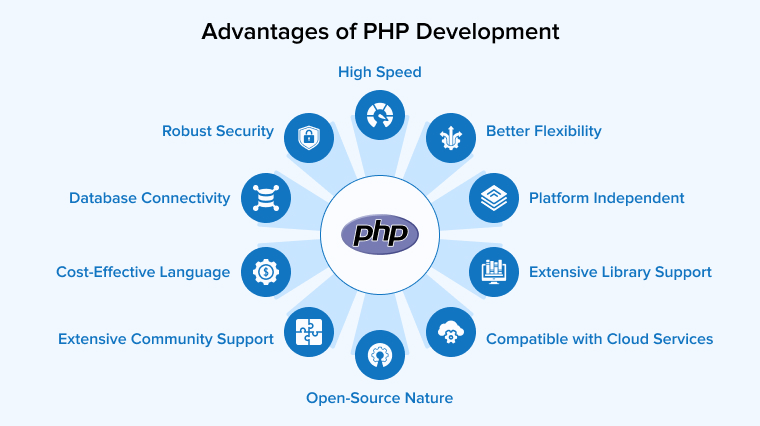
The reason why such an old language is still thriving amongst modern programming languages too, after over two decades of its initial release, is the countless advantages it offers. To make a tall list short, we would focus on the primary advantages of using PHP for development.
2.1 Extensive Community Support
PHP’s status as a traditional programming language certainly helps its popularity. Because it has been around for a while, PHP has built a huge and dedicated developer base over time that further helps in the advancement of the language. The initial benefits, like simplicity and efficiency, helped make PHP popular.
The PHP community has expanded significantly due to its rising popularity. This growing community is now continuously striving to resolve any challenges with PHP development, and helping community members turn these limitations into benefits. As a result, the community has gained more popularity and growth.
The PHP community has fostered a collaborative environment where a PHP developer can communicate with other developers to contribute or offer assistance. Moreover, the online forums and community blogs share knowledge that is helpful to PHP developers at all skill levels.
2.2 Database Connectivity
PHP’s built-in modules make it easy and secure to connect your web application with various databases, such as MongoDB, PostgreSQL, MySQL, and more. This helps reduce the time to connect with a database management system as well as allows effective data storage, access, and manipulation.
PHP also offers quite a few caching methods to help you avoid unnecessary or repeating database queries and computations. PHP uses JIT compilation and opcode caching to reduce the execution time and increase the loading speed, delivering a responsive user experience.
2.3 Better Flexibility
Sometimes implementing changes to your code is necessary to add or update a new functionality throughout the development stages. However, this can be challenging if your scripting language isn’t flexible enough. Fortunately, PHP is quite flexible. You can easily make changes to your PHP code, no matter if it’s a finished product or a work in progress.
Moreover, you can also combine PHP with other programming languages to obtain better results. Being a cross-platform language, PHP helps you create a platform-independent product.
2.4 Open-Source Nature
PHP is open-source. This means anyone can easily access its source code and use it for free to build websites and web applications.
Moreover, PHP supports various open-source content management systems, like Drupal and WordPress, along with frameworks like CodeIgniter and Laravel. You can easily leverage them to extend PHP functionalities and simplify the development process.
2.5 High Speed
When developing a web app using PHP, the app utilizes PHP’s memory space. PHP evenly distributes the workload among all web servers. This helps speed up the processing time and reduce the loading time.
The visitors can quickly access the web pages and enjoy a seamless user experience. The faster processing time of PHP helps build web applications like eCommerce platforms, content management systems (CMS), and customer relationship management (CRM) software
2.6 Compatible with Cloud Services
Using cloud computing services is a time-consuming need. Businesses subscribe to them for scalability and many other purposes. Many top cloud services like AWS Lambda support PHP-based apps. So, any web app developed using PHP can be easily deployed on the cloud server.
There is no other programming language that can help you with cloud deployment like PHP. PHP has established a leading position in cloud compatibility.
2.7 Cost-Effective Language
PHP won’t be a burden on your software development budget, as it is an open-source programming language. This means you can download and use it free of charge.
Using PHP doesn’t involve purchasing any costly software or licenses either. PHP also offers seamless integration with various databases. Even if you have to create custom websites or web applications, PHP helps you keep the costs at a minimum without compromising on quality.
2.8 Extensive Library Support
PHP offers an extensive library of pre-built functions and modules. Which is one of the most developer-friendly benefits as it helps speed up the software development process. So, instead of beginning everything from scratch, web developers can utilize existing code from the library and start building their applications.
Due to project-specific requirements, sometimes PHP programmers have to modify existing modules such as graphics and PDF before adding them. However, customization becomes easy when you are using PHP.
2.9 Robust Security
PHP is an effective choice for developing secure web applications that suit your business requirements. It promotes secure coding practices, which build a strong shield against different threats like XSS, SQL injection, data tampering, and so on. It also encourages the implementation of two-step authentication to enhance security further.
PHP includes built-in security features for hashing and encryption, which allow you to save sensitive information like personal data and passwords securely. Implementing these encryption techniques helps you keep unauthorized users out of your system and ensures the safety of the confidential data on your site.
Additionally, PHP security extensions allow you to execute cryptographic operations, the creation of digital signatures, and implement secure communication protocols. This way, you can improve the safety of data transmission across PHP applications.
2.10 Platform Independent
When you create a web application using PHP, it can run on various operating systems, improving accessibility for users across the globe. PHP supports every primary operating system, including Windows, Linux, MacOS, and Unix. It also supports major web browsers, making it one of the most preferred programming languages for developing web applications.
3. Disadvantages of PHP
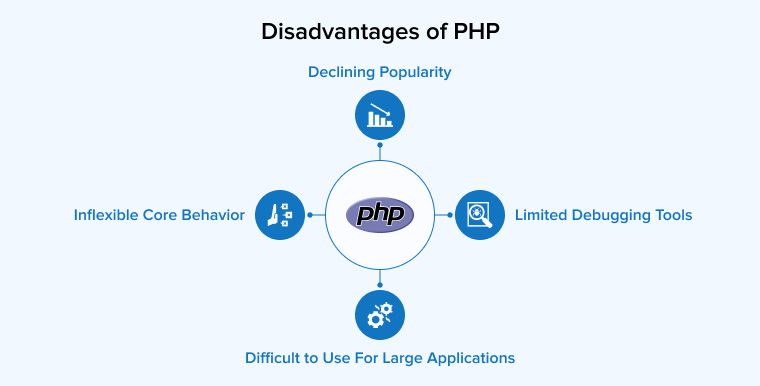
When discussing the usefulness of PHP in web development, it is essential to highlight the disadvantages as well. So that you don’t go in blindsided. Knowing the limitations also helps prepare for the challenges you might face along the journey.
3.1 Difficult to Use For Large Applications
PHP programming language is not highly modular, it isn’t a suitable option for building and maintaining large-scale web applications. Performance optimization is required in large and complex apps that handle high numbers of requests simultaneously.
3.2 Limited Debugging Tools
PHP is very poor at handling errors than other scripting languages. This is because the PHP language doesn’t offer effective debugging tools that can track and search for these errors. As a result, developers have to spend an overwhelming amount of time and effort to fix bugs.
3.3 Declining Popularity
PHP became an instant hit after its initial release because it was easy to learn and use. That helped in building a massive PHP community that contributed several robust tools and frameworks.
However, the advent of modern web technologies such as Python caused some massive shifts. The syntax of languages like Python is similar to the English language. So, it’s easier to learn and use them. Additionally, requires fewer lines of code than PHP to build the same application.
To meet modern enterprise requirements, it is essential to build large and complex apps that aren’t viable for PHP. The language is also not versatile enough to be used with other web development technologies.
The TIOBE Programming Community Index shows that from October 2023 to October 2024, PHP fell from 8th to 15th place in terms of popularity of programming languages.
Due to all these reasons, the usage, and popularity of PHP language are on the decline.
3.4 Inflexible Core Behavior
Although PHP allows you to build basic web applications and customize them, it does not allow any changes to the core behavior of any PHP framework. You can’t change the core behavior of the web app you build using the PHP framework either. This restricts innovation in web development and makes it difficult to build better web-based applications.
4. Conclusion
PHP is undoubtedly an intimidating option for web development. Its simplicity and extensive documentation offer a convenient development process. PHP also provides a comprehensive library with various tools and frameworks. Its flexibility and security allow you to deliver an enhanced user experience. This scripting language is also known for offering better efficiency and database connectivity.
Like many other programming languages, PHP also has its advantages and disadvantages. If you are picking PHP because its benefits fit your project requirements, then you must also prepare for the limitations that come with it.
FAQs
What are the advantages of using PHP instead of HTML?
Using PHP instead of HTML allows you to manage user input and dynamically process the data. While HTML only supports static content presentation, PHP helps you create interactive forms, conduct server-side validations, and process user-submitted data.
Why do we choose to use PHP?
Developers choose to use PHP for dynamic and custom website development because it offers a plethora of benefits including better flexibility, scalability, security, seamless integration capabilities, and more.
Why is PHP still so widely used?
PHP is an open-source programming language that enjoys the support of a massive community offering tons of resources to support web development. Moreover, it is easy to learn and use PHP, making it one of the most widely used programming languages.


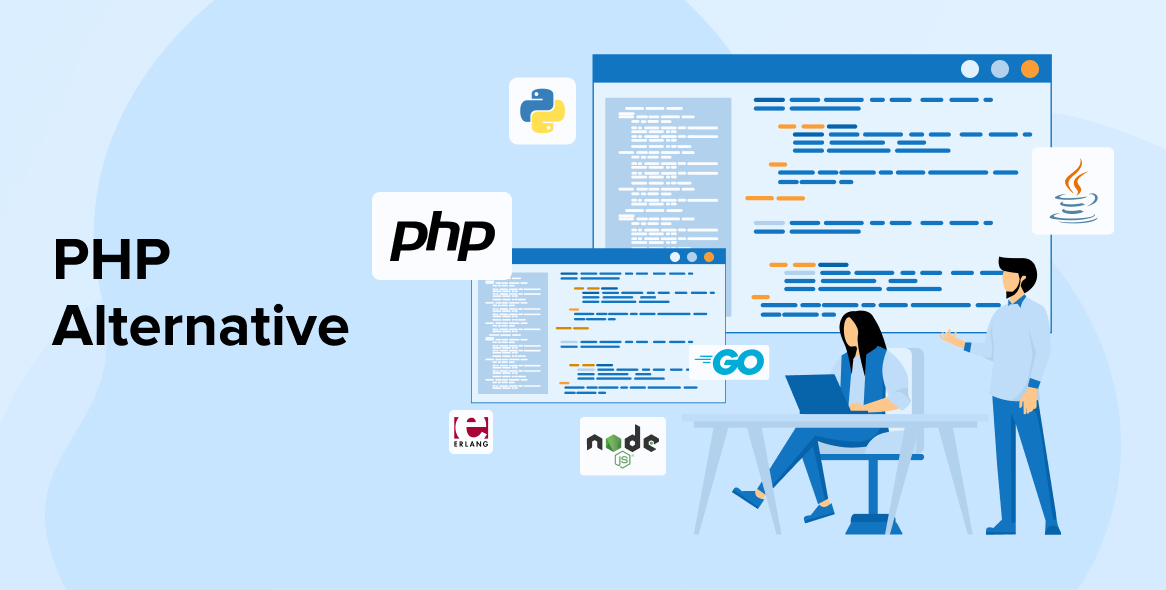
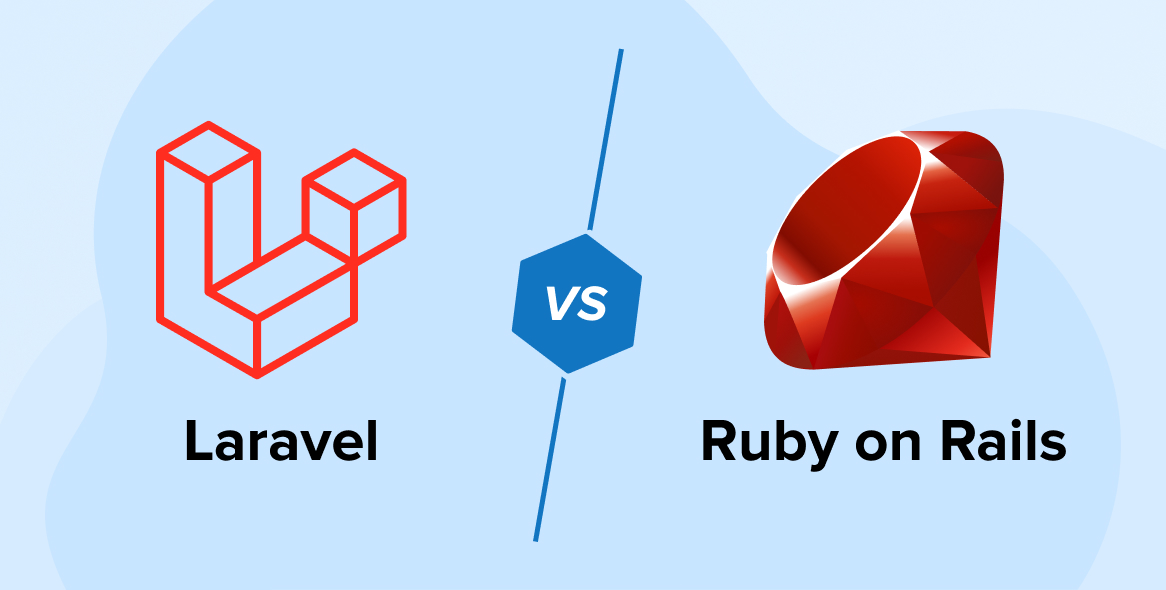
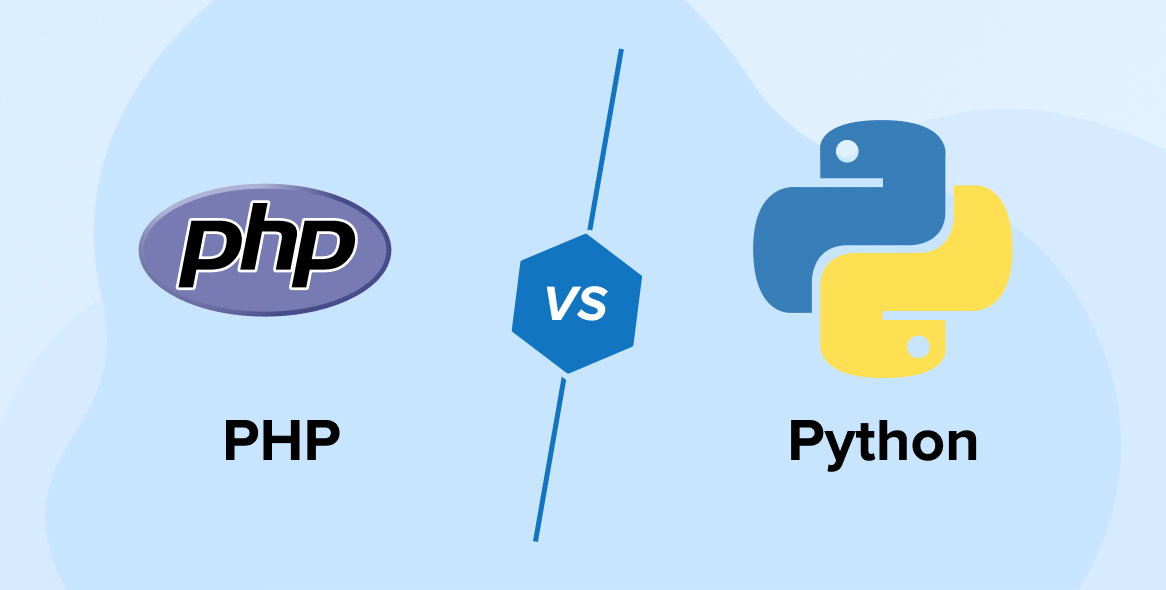

Comments
Leave a message...